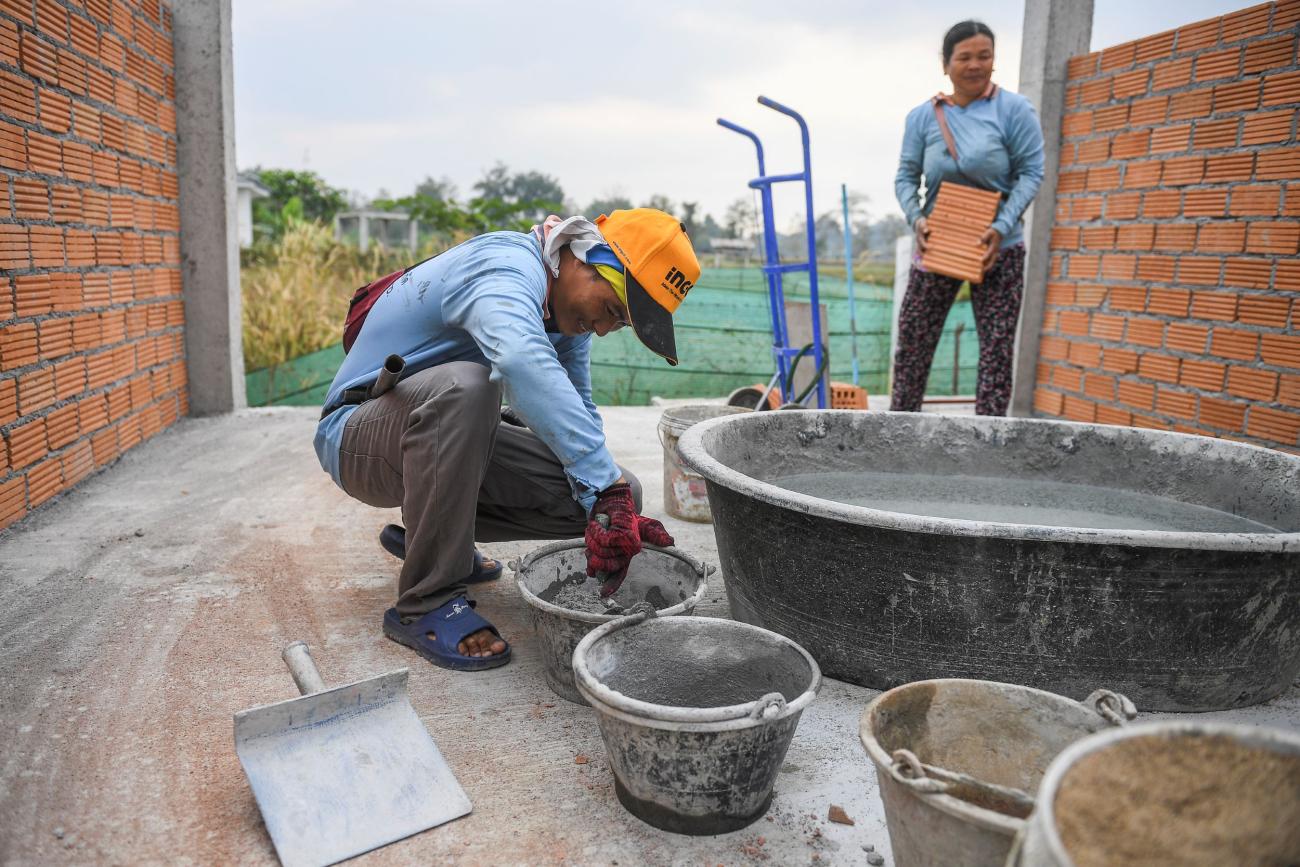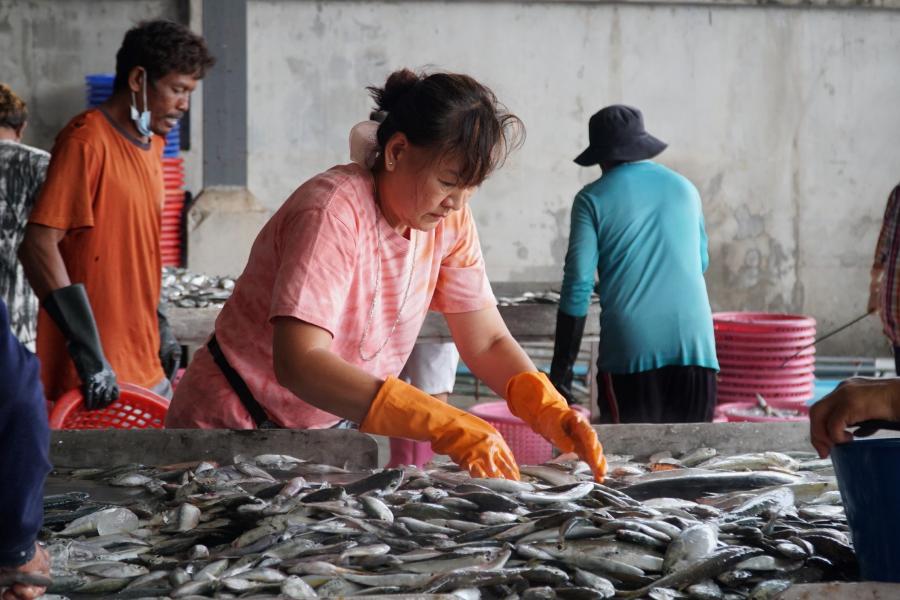Harsher realities for undocumented Myanmar migrant workers in Thailand, new UNDP survey shows

People who migrate to Thailand from Myanmar to work without documentation experience poor working conditions and have limited to no access to public services.
People who migrate to Thailand from Myanmar to work without documentation experience poor working conditions, have limited to no access to public services and face the constant threat of deportation, a new UNDP survey shows.
Yet they are critical in filling labour gaps in Thailand and supporting the country’s economy. Improving their working conditions and dismantling barriers preventing undocumented migrants from getting legal status, which improves their outcomes in Thailand, can benefit both the lives of migrants and support the country’s industries.
Conflict is gripping Myanmar, particularly close to Thailand, and economic turmoil is leaving people struggling to earn an income while prices for everyday goods rise. In these circumstances, people will continue to seek safety and a better life across the border. Desperate to leave Myanmar, it is the migrants who do not have the money or necessary information to cross into Thailand legally who find themselves at the greatest risk of exploitation and abuse.
"Seeking opportunities elsewhere: Exploring the lives and challenges of Myanmar migrant workers in Thailand", analyses survey responses from 2,249 migrants, of whom 37 percent were undocumented, living in 13 Thailand provinces who arrived after 1 February 2021.
Unequal working conditions
At $223 a month, undocumented women earned the lowest average salary, compared to documented men, who earn $338. While this remains above the legal minimum wage in Thailand, 17 percent of survey respondents reported earning less than this. Of these, over half were undocumented women.
Despite benefits, such as one day off a week, overtime pay and maternity leave being mandatory under Thai law, 40 percent of undocumented migrants said they received no additional job perks. This is double the number of respondents who were working in Thailand legally.
When migrants face these challenges, the vast majority are unable to access support, with 95 percent of documented migrants and 98 percent of undocumented migrants receiving no help at all.
There is also a gulf between the numbers of documented and undocumented migrants who are registered under the state’s safety nets, with 62 percent of documented migrants saying they were enrolled in social security and 44 percent in government health insurance. Meanwhile, for those without papers, the figures are just two and five percent, respectively.
This puts vital social protection mechanisms, such as injury and illness, unemployment, and child allowance benefits, out of reach of undocumented migrants who, with lower average earnings, have less to fall back on in harder times.

Mental health and access to health care services
Mental health issues are already significant in Myanmar, where conflict, displacement, and loss of income and livelihoods have been affecting people’s well-being since the military takeover in February 2021. Those migrating to Thailand may be bringing trauma with them, and after enduring difficult and expensive journeys, they can then face poor living conditions, discrimination, trouble assimilating and, for those without papers, the looming fear of deportation, which may exacerbate mental health issues.
Undocumented migrants reported high levels of anxiety or persistent sadness, as their precarious legal status leaves them open to exploitation. Yet mental health care services are difficult to access. Migrants rely on each other to create strong community relations and social support systems to support their mental well-being.
Few undocumented migrants (12 percent) also reported accessing public hospitals, compared to more than half (54 percent) of those who are in Thailand legally. High costs were reported as a barrier to using health care services for 18 percent of respondents, which could be alleviated through affordable health insurance. Yet a lack of accessible information on these plans means they are often underused.
The challenges of migrating
Despite the better experiences of documented migrants, it costs, on average, $124 more to migrate to Thailand with the correct papers. This is a prohibitively expensive figure for many people in Myanmar who have limited financial resources. In addition, there is little trustworthy information about the process available to migrants, with 95 percent of migrants relying on friends and families for guidance, which further hinders migrating legally.
Without the right information or enough money, and desperate to flee conditions in Myanmar to find safety and a decent income to support themselves and their families, many migrants have no option but to migrate without documentation. This leaves them at greater risk of exploitation.
These undocumented migrants are more likely to be younger, which may mean work with lower wages and a weaker support network, and have a lower educational background, further entrenching their poor prospects for better jobs and working conditions.
Of the migrants UNDP surveyed, there were 30 percent more women undocumented than men, leaving them at risk through the migration process, during which there are higher chances of sexual harassment and abuse, which are amplified when migrating solo or if evading arrest.
Titon Mitra, UNDP Myanmar’s Resident Representative, said: "Thailand has long relied on the affordable labour of Myanmar migrants to fill employment gaps. Many have limited financial resources and few other options, leaving them in a desperate position in which they are at risk of exploitation."
"Dismantling the barriers Myanmar migrants face to attaining legal status and increasing the incentives to getting the paperwork are critical first steps to helping protect them in Thailand. A safe environment, free from exploitation, can benefit both migrants and support the development of both Thailand and Myanmar."
"Implementing better monitoring of workplaces and allowing migrants better representation in unions to enhance their collective bargaining power can help further improve the situation.
"Health care need to be more accessible. Affordable insurance policies need to be better promoted, and mental health support services need to be culturally sensitive and address the potential challenges Myanmar migrants may have faced in the current context."
Read the full report to explore the survey findings in detail and find out more about the Myanmar Development Observatory.
*This story is originally published on the UNDP Myanmar website on November 30.




